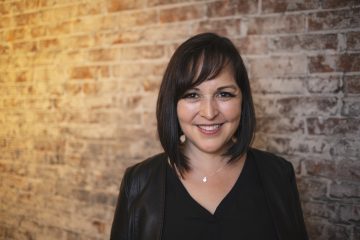Biography

Carolyn Roberts uses her voice to support Indigenous resurgence through education. She is a Coast Salish woman belonging to the Squamish Nation—her birth mother is from N’Quatqua Nation and her birth father is from Tzeachten Nation. Carolyn is an Indigenous academic who holds two degrees from UBC: a Master of Education in educational administration and leadership and a Bachelor of Education. She also holds a bachelor’s degree in jazz studies from Capilano University. She has been an educator and administrator for over 20 years and is currently a faculty member in the Department of Education at Simon Fraser University.
Meeting Carolyn
What is your most memorable experience from your time in the Faculty of Education?
My most memorable and valuable thing that I received during my time in the Faculty of Education was being a part of the cohorts. Within these cohort groups, we were given the opportunity to grow alongside a group of people that became our support system. In our everyday lives in education, we do not have the same opportunity to develop such strong connections and learning opportunities. When you are in your classroom, you are usually alone or with very few other people during the day. In these cohorts, you have this group of amazing people that you get spend your days with. You learn and grow together as a family. These cohorts have become my network of support in my work life. I believe that I will have these supports for my entire life.
Where has your education from the Faculty of Education taken you in your career?
My career has been built upon the opportunities that my education has given me. After I finished my BEd at UBC, I joined the Aboriginal department in the Langley School District as an educator. Being part of the Ab Ed team allowed me the opportunity to travel around the district and make strong connections. I was then accepted into the ground-breaking UBC master’s cohort with the Squamish Nation for my master’s degree in educational administration and leadership. This master’s program changed me and changed my life. The program gave me the opportunity to grow, learn, and to use my voice as an Indigenous educator and leader. I have developed a strong Indigenous voice for change because of this program. I was then promoted to vice-principal in the Langley School District. From this experience, I then took a leap of faith and accepted the role of principal of our on-reserve elementary school for the Squamish Nation. I have been so lucky to have had all of these opportunities to grow and develop into the educational leader I am today because of the education I received at UBC. I am currently starting a new role at Simon Fraser University as a faculty member in the Faculty of Education. I now get to pass on the knowledge I have gathered along the way to a whole new generation of educators. I am so thankful for the journey that brought me to where I am today.
Where do issues of inclusion find a place in your life or at work?
Inclusion is a hot topic in the educational world today. I work with inclusion and including every day of my life. We are creating a new generation of adults—how do we see the world including and making room for all people? How do we change current opinions and shape the new generation? It starts with our children. It is with education that we can be the front-line workers of change for Indigenous people. We have the opportunity to educate about the true history of Canada and how our governmental system still to this day works against the Indigenous people of Turtle Island. I have a powerful faith in our future. We have the opportunity today to build up our communities to be like our ancestors have guided us to be. It is with our leadership and education in this generation that will help bring us back to who we truly are as strong Indigenous people. It’s time for the change to take place.
Do you have any words of wisdom for current students? Newly graduated folks?
My words of wisdom for students and recent grads: education plants the seeds in us to give us a new perspective—a new outlook that may shift our thinking and could possibly shift our whole entire path in life. We will never know walking into these classes at UBC what the future holds for us, but we do know that taking that step—opening ourselves up to the possibilities—will give us a new door to open, a new path to take, or a new journey that we never thought was possible, all because we took that first step. Be open to the possibilities, because they can change your life. You have the opportunity to change the world and make it a better place. It is in your hands to make a difference. So take that step!